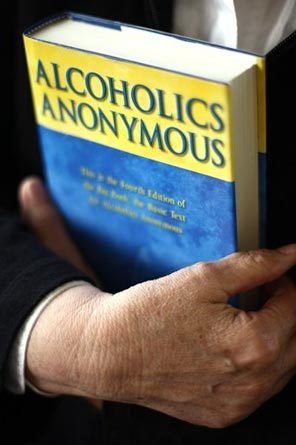
A DrHurd.com reader writes: I totally agree with your view that alcoholism is not a disease. In January 2009 I had my doctor enter me into hospital rehab for a week for my alcoholism. I have been in and out of AA since.
However I have always had an issue with the “group think” of AA. Although I don’t consider it a cult, as such, the ideas do seem socialistic.
I too am a fan of Ayn Rand’s philosophy, Objectivism. I do feel like a part of me has been brainwashed in AA doctrine. I do see a psychologist on a weekly basis, feeling like I live a double life.
I often tell people who feel this way that when they leave the AA meeting (or the therapy session), they’re still the only one with themselves, 24/7.
If you never have another drink, then it’s because of your choice not to do so. If you want to have another drink badly enough that you give in and do so, then not even 365 AA meetings a year will stop you. In the end, it’s all about the individual’s choices. The group cannot make you stop, do or change anything.
I’m not saying groups are bad or never helpful. However, when a group is helpful, it’s only because of the impact that members of that group have on an individual mind. It’s reasoning, thinking, ideas and logical persuasion that matter. This is true whether the issue involves stopping a destructive habit, or creating anything of value.
Too often, people fantasize that something or someone else – somehow – can give them the strength or the courage to accomplish something difficult. “Somehow” is the fallacy here. There is no “somehow.”
You will never change anything in your life, including your actions or your thinking, without the impact of logical persuasion. Somebody might make a new point to persuade when you are ready to hear it at the right time. As a result, your mind is changed, and your actions are altered as a result.
I have no doubt this happens both within and outside of AA circles. However, when it does, it’s not because of some indefinable “somehow.” It’s because a mind was penetrated with persuasive ideas at the right time, and as a result, behavioral change took place.
We’ve all heard the phrase, “the power of persuasion.” When persuasion occurs, where does it happen? Does it happen in “the group”? There’s no such thing as a collective brain. There are only individual minds and brains. There are only individuals making choices.
If an individual goes to something like AA and begins to change his or her mind about drinking and various other behaviors as a result, this is only because his or her mind was affected and changed by some new way of thinking. Group pressure, in such situations, does sometimes have its place. For example, I have known alcoholics going to AA meetings who say, “I can’t bear the thought of slipping up. I’ll have to go to an AA meeting and face the shame and embarrassment of saying so. Or else lying, which would be worse.”
In such a case, the group is still not “making” the person do anything. The person who feels this way has already decided, concluded or otherwise been persuaded that drinking is a bad and destructive habit. Because of this, it seems embarrassing and shameful to have to reveal to one’s trusted friends or associates that one has done something bad or wrong. In such a situation, the group pressure only has meaning because of anti-drinking ideas which the individual has already accepted and internalized.
If the person did not agree with his or her fellow AA members that drinking is bad and wrong, then their disapproval would matter a lot less, if at all. In some people’s minds, the group takes on a mythical, almost supernatural kind of identity. It’s as if the whole becomes something more than the sum of its parts.
In believing such a faulty premise, people start to feel, hope or believe that others can be responsible for their actions. Yet in any given moment, an individual person is the only one responsible for what he or she does with his or her body, mouth, legs, arms, mind or anything else.
This is the fact that many find so hard to face. And this is the deeper problem, deeper than the alcoholism (or other behavioral problem) itself.
I often hear former AA members, such as this reader, say things like, “A lot of people in the AA group seem to substitute the group for the alcohol.” It actually makes sense. If you fail to develop an appreciation for, and an understanding of your own individuality as rooted in the rational and objective thinking of your own independent mind, then, by default, you have to go somewhere else. For some it’s the supernatural God (AA pushes this too), for others the fantasy of the group, and for still others a combination of both.
While it’s laudable and helpful that such AA “group think” types have stopped drinking, it’s also the case that they have not yet addressed the root of their problem.
The root of the problem is self-confidence, arising from an understanding that your rational thinking – exercised solely as an individual – is what makes you moral, and fit for life. Nothing else will do.
Follow Dr. Hurd on Facebook. Search under “Michael Hurd” (Rehoboth Beach DE). Get up-to-the-minute postings, recommended articles and links, and engage in back-and-forth discussion with Dr. Hurd on topics of interest. Also follow Dr. Hurd on Twitter at @MichaelJHurd1
Dr. Hurd is now a Newsmax Insider! Check out his new column here.
